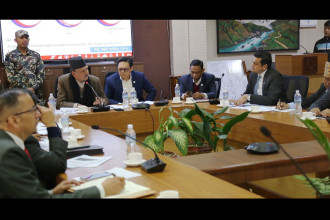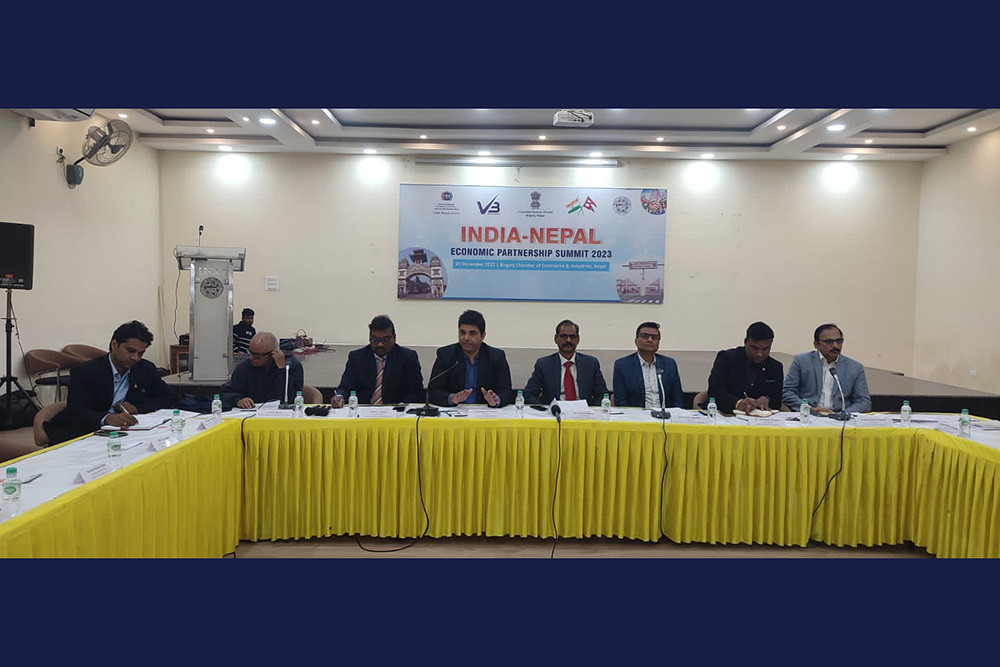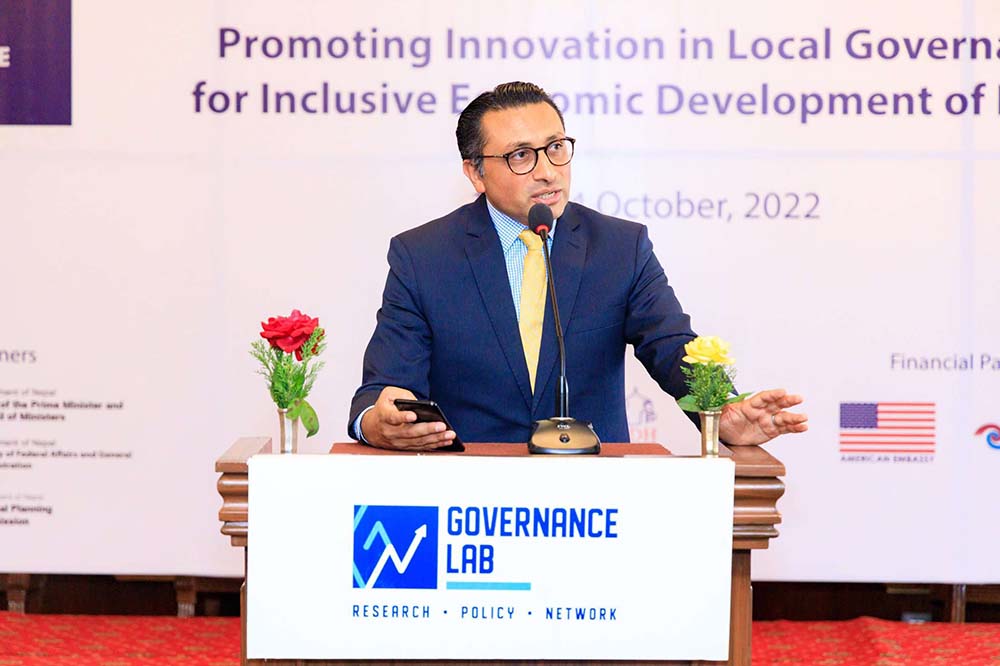
- Promoting Innovation in Local Governance for Inclusive Economic Development of Nepal
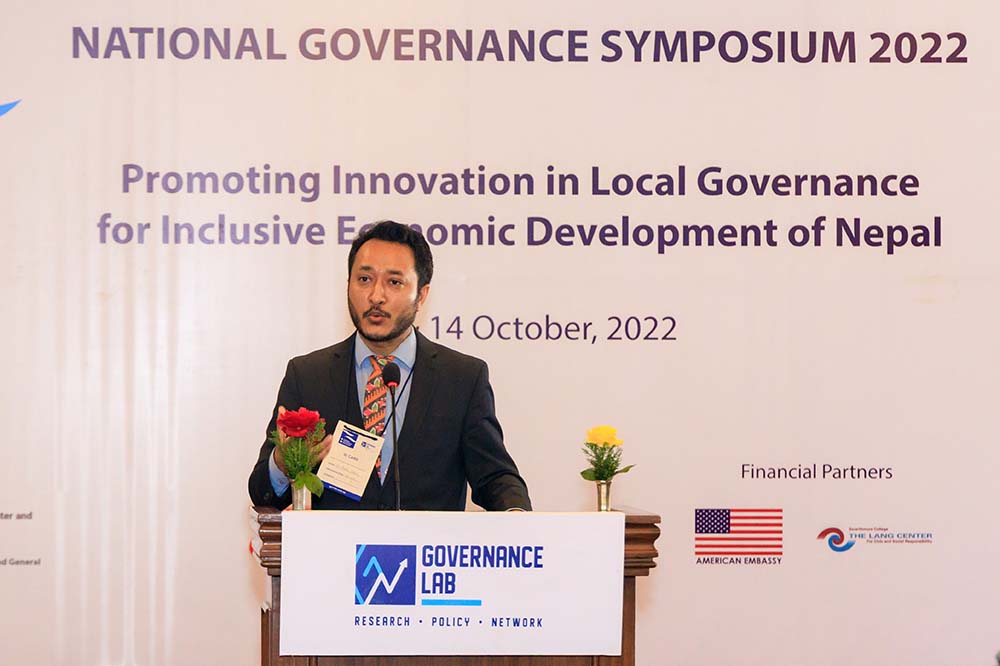 Chairperson of Governance Lab, Pukar Malla speaks at National Governance Symposium 2022 organised by the Governance Lab.[/caption]
On the first day, 11 municipalities from six provinces of Nepal shared their public innovations, key lessons and scale-up opportunities and on the second day, national stakeholders deliberated on ways to institutionalise the learning from the first day and scaled up policy impact. The Symposium concluded with the Kathmandu Declaration for Collective Action which highlights ‘Inclusion, Innovation, Local Governance and Economic Development’ as the four core commitment areas. The Chairperson of Governance Lab, Pukar Malla made the declaration public.
[caption id="attachment_29801" align="alignnone" width="1000"]
Chairperson of Governance Lab, Pukar Malla speaks at National Governance Symposium 2022 organised by the Governance Lab.[/caption]
On the first day, 11 municipalities from six provinces of Nepal shared their public innovations, key lessons and scale-up opportunities and on the second day, national stakeholders deliberated on ways to institutionalise the learning from the first day and scaled up policy impact. The Symposium concluded with the Kathmandu Declaration for Collective Action which highlights ‘Inclusion, Innovation, Local Governance and Economic Development’ as the four core commitment areas. The Chairperson of Governance Lab, Pukar Malla made the declaration public.
[caption id="attachment_29801" align="alignnone" width="1000"]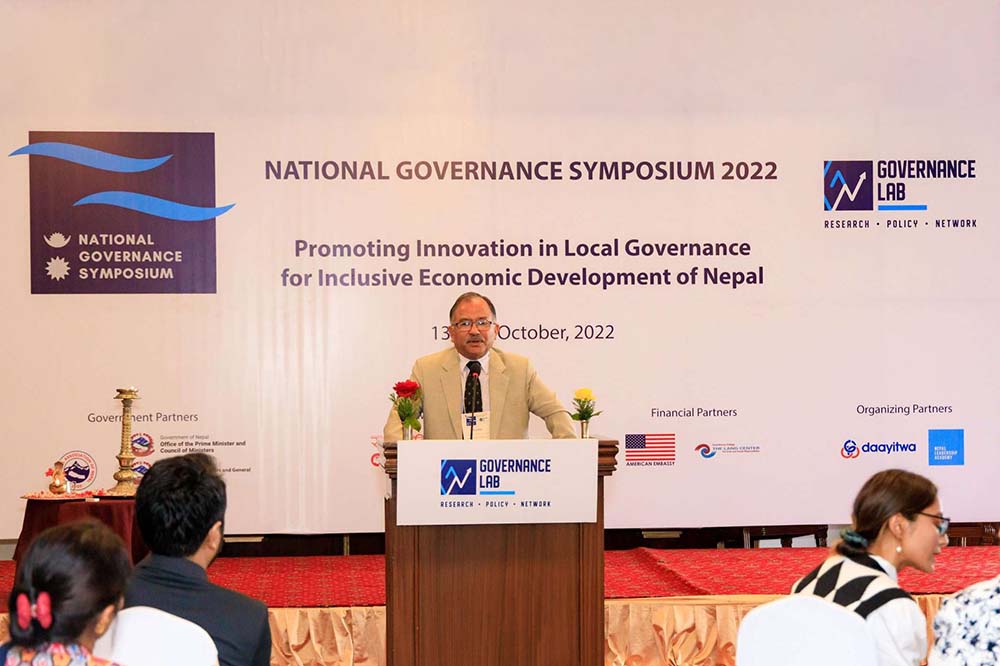 Kalyan Shrestha, former Chief Justice of the Supreme Court of Nepal, speaks at National Governance Symposium 2022 organised by the Governance Lab.[/caption]
Inaugurating the National Governance Symposium 2022, Kalyan Shrestha, former Chief Justice of the Supreme Court of Nepal said, “Development without inclusiveness, will not bring peace but crisis. Our development plans and policies have not been able to incorporate inclusiveness so far. Therefore, it is very important that we create a common vision about inclusive development in Nepal.”
[caption id="attachment_29803" align="alignnone" width="1000"]
Kalyan Shrestha, former Chief Justice of the Supreme Court of Nepal, speaks at National Governance Symposium 2022 organised by the Governance Lab.[/caption]
Inaugurating the National Governance Symposium 2022, Kalyan Shrestha, former Chief Justice of the Supreme Court of Nepal said, “Development without inclusiveness, will not bring peace but crisis. Our development plans and policies have not been able to incorporate inclusiveness so far. Therefore, it is very important that we create a common vision about inclusive development in Nepal.”
[caption id="attachment_29803" align="alignnone" width="1000"] Dr Swarnim Wagle, former Vice-Chair of National Planning Commission and Chairperson of the Institute of Integrated Development Studies addresses National Governance Symposium 2022 organised by the Governance Lab.[/caption]
Addressing the event as the keynote speaker on the second day, Dr Swarnim Wagle, Former Vice-Chair of National Planning Commission and Chairperson of the Institute of Integrated Development Studies, stated that, “Federalism wasn't given a fair chance due to the heavily divided public and political opinion over its adoption and that it was reflected in performance of local governments. Implementing truly innovative financing and citizens feedback mechanisms, digitisation of services, increasing local citizens' engagement and promoting financial literacy is paramount for ensuring accountability, transparency, and overall good governance”.
Mohna Ansari, Human Rights Activist and Former Commissioner of National Human Rights Commission, said, “We assumed that magic-like changes would happen when the country upgraded to federalism after the years-long struggle. But we were not able to wipe out the deeply rooted ‘central mindset’ of people which is the major reason behind the failure in service delivery of local government”.
Making his closing remarks, Krishna Gyawali, former Secretary of the Government of Nepal, highlighted the importance of good governance for the success of federalism. He said, “Primarily federalism is essential for the management of diversity and discrimination in Nepal. But without ensuring local governance and inclusive economic development, federalism cannot be strengthened.”
Highlighting the objectives of organising this symposium and sharing the experience of working in the field of governance in the past ten years, Governance Lab Chairperson Malla said, “Nepal’s governance system will be strengthened only when the trust gap among the government, community and private sector gets filled and this triangular collaboration gets stronger. This is the reason why this symposium has been organised to bring together all relevant stakeholders on one platform and develop a common understanding and declaration to move forward in strengthening the governance system.”
The Symposium brought together Secretaries from various relevant Ministries as speakers on various case sessions, governance dialogues, knowledge seminars and keynotes. Madhu Marasini, Secretary, Office of the Prime Minister and Council of Ministers (OPMCM), made his special remarks on day one. Likewise, Kewal Bhandari, Secretary, National Planning Commission; Baikuntha Aryal, Secretary, Ministry of Communication and Information Technology; and Toya Narayan Gyawali, Secretary, Ministry of Industry, Commerce and Supplies chaired various sessions.
Andrew Long, Head of Governance, Politics and Services, Foreign, Commonwealth and Development Office, British Embassy, Kathmandu, and Ramesh Adhikari, Election, Legislative and Political Processes Specialist, Democracy and Governance Office, USAID Nepal, also made their special remarks.
Similarly, day two witnessed a seminar on ‘Building Gender Sensitivity in Government Institutions’ and various dialogue sessions, where international experts and scholars like Prof Soledad Prillaman, Assistant Professor of Political Science, Stanford University; and Prof Ben Berger, Associate Professor of Political Science and Executive Director, Lang Centre for Civic & Social Responsibility, Swarthmore College joined virtually as keynote speakers.
The National Governance Symposium 2022 was organised by Governance Lab in collaboration with Daayitwa and Nepal Leadership Academy as organising partners with support from the OPMCM, Ministry of Federal Affairs and General Administration, National Planning Commission and Municipal Association of Nepal as the Government Partners, and Economic Policy Incubator Programme (Palladium and FCDO), Nepal Urban Resilience Program (ICF and BEK/FCDO) and Sub National Governance Program (The Asia Foundation and DFAT) as Knowledge Partners, and Lang Center for Civic and Social Responsibility at Swarthmore College and Public Affairs Section at US Embassy as Financial Partners, with the objective, to share innovative practices of local governments, to discuss ways to bolster the local governance system and to strengthen the networking among stakeholders working in public policy and governance.
The Governance Lab at Daayitwa Abhiyaan is a Nepal-based research firm that enables the government to make evidence-based policy decisions by conducting policy research, strengthening policy implementation capacity and fortifying research and governance ecosystems.
Daayitwa Abhiyaan is a youth-led movement for an enterprising Nepal where every individual has opportunities for a prosperous future.
Dr Swarnim Wagle, former Vice-Chair of National Planning Commission and Chairperson of the Institute of Integrated Development Studies addresses National Governance Symposium 2022 organised by the Governance Lab.[/caption]
Addressing the event as the keynote speaker on the second day, Dr Swarnim Wagle, Former Vice-Chair of National Planning Commission and Chairperson of the Institute of Integrated Development Studies, stated that, “Federalism wasn't given a fair chance due to the heavily divided public and political opinion over its adoption and that it was reflected in performance of local governments. Implementing truly innovative financing and citizens feedback mechanisms, digitisation of services, increasing local citizens' engagement and promoting financial literacy is paramount for ensuring accountability, transparency, and overall good governance”.
Mohna Ansari, Human Rights Activist and Former Commissioner of National Human Rights Commission, said, “We assumed that magic-like changes would happen when the country upgraded to federalism after the years-long struggle. But we were not able to wipe out the deeply rooted ‘central mindset’ of people which is the major reason behind the failure in service delivery of local government”.
Making his closing remarks, Krishna Gyawali, former Secretary of the Government of Nepal, highlighted the importance of good governance for the success of federalism. He said, “Primarily federalism is essential for the management of diversity and discrimination in Nepal. But without ensuring local governance and inclusive economic development, federalism cannot be strengthened.”
Highlighting the objectives of organising this symposium and sharing the experience of working in the field of governance in the past ten years, Governance Lab Chairperson Malla said, “Nepal’s governance system will be strengthened only when the trust gap among the government, community and private sector gets filled and this triangular collaboration gets stronger. This is the reason why this symposium has been organised to bring together all relevant stakeholders on one platform and develop a common understanding and declaration to move forward in strengthening the governance system.”
The Symposium brought together Secretaries from various relevant Ministries as speakers on various case sessions, governance dialogues, knowledge seminars and keynotes. Madhu Marasini, Secretary, Office of the Prime Minister and Council of Ministers (OPMCM), made his special remarks on day one. Likewise, Kewal Bhandari, Secretary, National Planning Commission; Baikuntha Aryal, Secretary, Ministry of Communication and Information Technology; and Toya Narayan Gyawali, Secretary, Ministry of Industry, Commerce and Supplies chaired various sessions.
Andrew Long, Head of Governance, Politics and Services, Foreign, Commonwealth and Development Office, British Embassy, Kathmandu, and Ramesh Adhikari, Election, Legislative and Political Processes Specialist, Democracy and Governance Office, USAID Nepal, also made their special remarks.
Similarly, day two witnessed a seminar on ‘Building Gender Sensitivity in Government Institutions’ and various dialogue sessions, where international experts and scholars like Prof Soledad Prillaman, Assistant Professor of Political Science, Stanford University; and Prof Ben Berger, Associate Professor of Political Science and Executive Director, Lang Centre for Civic & Social Responsibility, Swarthmore College joined virtually as keynote speakers.
The National Governance Symposium 2022 was organised by Governance Lab in collaboration with Daayitwa and Nepal Leadership Academy as organising partners with support from the OPMCM, Ministry of Federal Affairs and General Administration, National Planning Commission and Municipal Association of Nepal as the Government Partners, and Economic Policy Incubator Programme (Palladium and FCDO), Nepal Urban Resilience Program (ICF and BEK/FCDO) and Sub National Governance Program (The Asia Foundation and DFAT) as Knowledge Partners, and Lang Center for Civic and Social Responsibility at Swarthmore College and Public Affairs Section at US Embassy as Financial Partners, with the objective, to share innovative practices of local governments, to discuss ways to bolster the local governance system and to strengthen the networking among stakeholders working in public policy and governance.
The Governance Lab at Daayitwa Abhiyaan is a Nepal-based research firm that enables the government to make evidence-based policy decisions by conducting policy research, strengthening policy implementation capacity and fortifying research and governance ecosystems.
Daayitwa Abhiyaan is a youth-led movement for an enterprising Nepal where every individual has opportunities for a prosperous future.
Case Sessions, Dialogues and Seminar details Day 1 Trilochan Pokharel, Trilochan PokharelNepal Administrative Staff College chaired the session on ‘Adaptive Multi-Stakeholder Management for Local Economic Growth’ where Musikot, Sunwal and Tilottama municipalities shared their experiences through municipality presentations, and Salina Bhattarai, Governance and Research Coordinator, Governance Lab, and Binda Magar, Policy Advisor (Governance) and Assistant Resident Representative (Programme) were the facilitator and discussant. Kewal Bhandari, Secretary, National Planning Commission chaired the session on ‘Public Private Partnership’ where representatives from Tansen, Tilottama and Waling municipalities shared their experiences through municipality presentations, and Keshav Acharya, Manager, Institutional Strengthening, EPI and Sirjana Ale, Economist, Nepal Urban Resilience Project, BEK-FCDO were the facilitator and discussant. Baikuntha Aryal, Secretary, Ministry of Communication and Information Technology chaired the session on ‘Green, Resilient and Inclusive Development’ where Butwal, Janakpurdham and Pokhara municipalities shared their experiences through municipality presentations, and Ajay Chandra Lal, Built Environment Expert, NURP and Shilshila Acharya, Environmentalist and Director of Avni Ventures were the facilitator and discussant. Toya Narayan Gyawali, Secretary, Ministry of Industry, Commerce and Supplies chaired the session on Inclusive ‘Policy Making for Local Economic Development’ where Bhimeshwar, Birendranagar and Tikapur municipalities shared their experiences through municipality presentations, and Bishnu Adhikari, Governance Director, The Asia Foundation and Kalpana Khanal, Senior Research Fellow and Head, Centre for Economics and Infrastructure Policy Research, Policy Research Institute were the facilitator and discussant.
Day 2 The seminar on ‘Building Gender Sensitivity in Government Institutions’ featured experts, Binda Pandey, Politician and Author of ‘Women in Nepali Politics’, Bipin Adhikari, Professor of Law, KU School of Law and Sucheta Pyakuryal, Director, Centre for Governance, Institute of Integrated Development Studies as the speakers where Bimala Aryal, Mayor, Sunwal Municipality was the discussant and Nisha Onta, Executive Director and Dhruba Bhandari, Doctoral Research Fellow at Governance Lab were the Facilitators. Dialogue Session on ‘Mobilizing Public Resources for Improved Municipal Governance’ moderated by Prateek Pradhan, Editor in Chief, Baahrakhari Media featured Hon. Asta Laxmi Shakya, Former Chief Minister, Bagmati Province Government, Mr. Bhim Prasad Dhungana, General Secretary, Municipality Association of Nepal and Mayor, Nilkantha Municipality, Hon. Balananda Poudel, Chairperson, National Natural Resource and Fiscal Commission, Govind Pokharel, Former Vice Chairperson, National Planning Commission as the panellists and Smriti Sharma, Head of Public Sector Engagement and New Initiatives, Nepal Infrastructure Bank as commentators. Another dialogue on ‘Strengthening Citizen Engagement for Improved Municipal Governance’ moderated by Mr. Kiran Chapagain, Executive Director, Nepal Policy Institute featured Gopi Khanal, Principal Secretary, Office of the Chief Minister and Council of Ministers, Karnali Province Government Hari Bahadur Thapa, Author and Journalist, Adv. Meera Dhungana, Senior Legal Adviser, Forum for Women, Law and Development, Ms. Mohna Ansari, Human Rights Activist and Former Commissioner, National Human Rights Commission as the panellists and Keshav Acharya, Governance Advisor (Local Governance and Capacity Development), German Development Cooperation and Narayan Adhikari, Co-Founder and Nepal Country Lead, Accountability Lab as commentators. The final panel on ‘Road to Innovation in Local Economic Governance’ moderated by the Media Person Rupesh Shrestha featured Local Political Representatives from participating municipalities across 6 provinces (Birendranagar, Bhimeshwar, Butwal, Janakpurdham, Musikot, Nilkantha, Pokhara, Sunwal, Tansen, Tilottama, Tikapur, and Waling) as panellists.
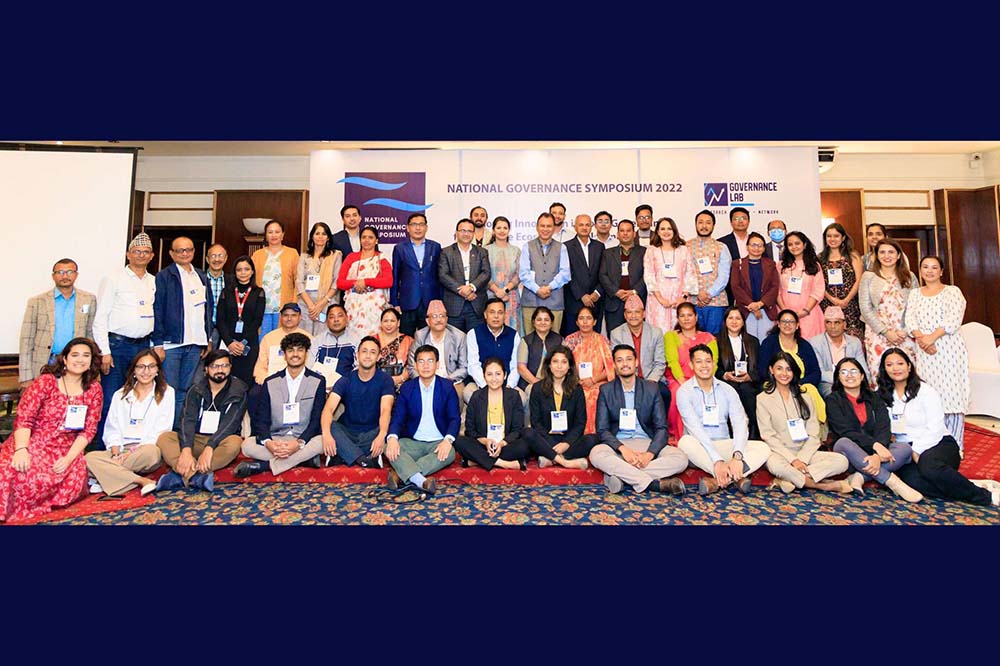 READ ALSO:
READ ALSO:
Published Date: October 20, 2022, 12:00 am
Post Comment
E-Magazine

Click Here To Read Full Issue
RELATED B360 National

